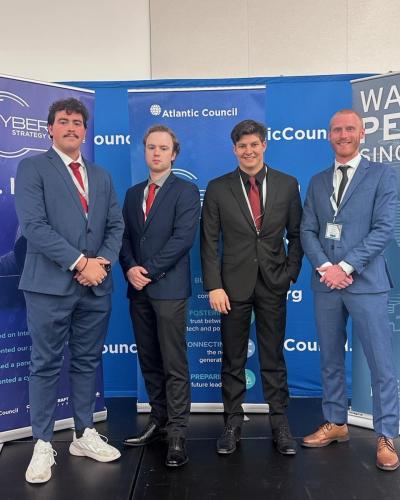Propelling Cybersecurity and Policy Forward at ASU
By Paul Willett
The School of Civic and Economic Thought and Leadership (SCETL) is actively supporting students interested in cyber policy. In March, the school sponsored a team of students to compete in the Cyber 9/12 Strategy Challenge in Washington D.C. The SCETL team consisted of Jack Silver (Junior, Civic and Economic Thought and Leadership, B.S./Business Law, B.A.), Alexander England (Junior, Civic and Economic Thought and Leadership, B.S.), Alexander Hoffman (Senior, Civic and Economic Thought and Leadership, B.A./History, B.S.), and Joseph Kavetsky (Junior, Civic and Economic Thought and Leadership, B.A./Political Science, B.A.). ASU's Air Force ROTC team also competed and consisted of Steffanie Urbano, Landry Howard, Gannon Gebauer, Angel-Lorence Dipad, and Benjamin Herrera.
Sponsored by the Atlantic Council, the Cyber 9/12 Strategy Challenge offers a unique cyber policy experience aimed at giving students a comprehensive look into the policy and strategy dilemmas involved in navigating a cyber crisis. The ASU teams competed against teams from Harvard, Yale, West Point, and other elite universities in this 2-day event. The teams are provided a realistic, but evolving simulated international cyber crisis. The task is to provide a comprehensive policy solution that will address the problem from multiple perspectives. Students also have the opportunity to meet government and private sector cyber practitioners and participate in workshops and network with both cyber experts and fellow students. Silver said of the experience, “Cyber 9/12 Challenge was a great practical application of what we learn in the classroom and it further honed my public speaking and communication skills. Having the chance to network with industry leaders in D.C. was an incredible opportunity.”
The competition doesn’t necessarily require a technology background. Kavetsky states this is, “a fantastic opportunity for people interested in practical political skills. It is geared towards those who have a background in policy and who also have an interest in technology.” The SCETL students are planning to create a student organization that will be centered around and prepare teams for future iterations of this event. The Cyber 9/12 Strategy challenges are held internationally, virtually, and also on a regional basis. Silver says that this could “be a wonderful experience for any computer science majors or liberal arts majors.”
The student team was led by SCETL Professors COL Bruce Pagel (Ret.) and Luke Perez. COL Pagel emphasized the incredible experience that this is for students. "This is an outstanding opportunity to observe how high-ranking government officials operate and who they are,” said Pagel. Traveling and competing in Washington D.C. is not only an exciting prospect, but as Hoffman notes, “this was a unique experience that allowed me and my teammates a glimpse into the Washington legislative process.” The judges at this competition are elite cyber experts practicing in both the government and private sectors. The opportunity for ASU students to interact with these technology and policy leaders is invaluable.
COL Pagel is also leading an effort to establish a new SCETL 1-credit cyber policy course for Spring 2025. This, alongside the student organization, will create opportunities for students to learn more about cyber policy and prepare for the next Cyber 9/12 Strategy Challenge. England hopes that these opportunities will appeal to ”both the technical and geopolitical inclined students in a great way.”
